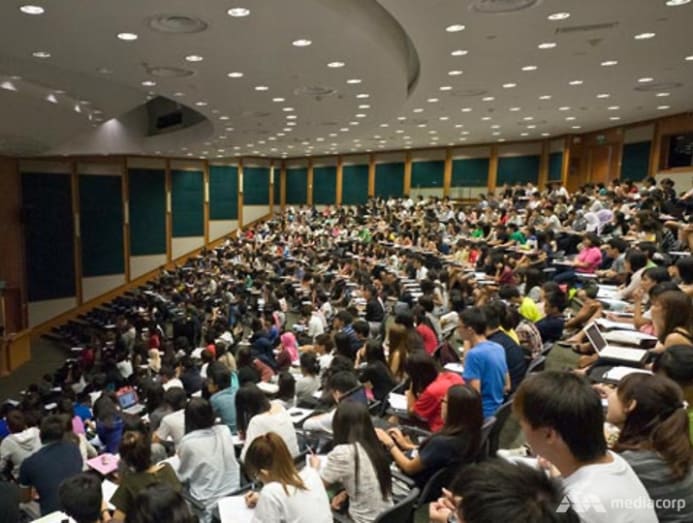commentary Commentary
Commentary: Hire an arts graduate to formulate business strategy. Why not?
With several new autonomous universities emerging in the last few years and a new arts university on the horizon, employers must embrace candidates from diverse educational backgrounds, says PeopleSearch Singapore’s Jaime Lim.

(Photo: Unsplash/Stefan Stefancik)
SINGAPORE: Singapore will soon have an arts university, the first of its kind in the country. In announcing this on Mar 3, Minister for Education, Lawrence Wong acknowledged that in the next phase of Singapore’s development, a diversity of talent is needed, not just in STEM, but also in the arts, design and media.
In today’s business environment, those with talent and expertise in these fields can contribute to, not just the arts community and creative industries, but a wide range of business functions.
Since COVID-19, the demand for talent in areas such as digital marketing and data storytelling has increased exponentially. With businesses moving online as a result of pandemic mitigation measures, user experience and interface designers are needed to ensure the best possible consumer experience.
Writers and artists also play an important role in making meaning of complex information and communicating it in a palatable fashion across digital channels.
READ: Commentary: Arts and humanities can set you up for life in post-coronavirus world
WATCH: Singapore's first university of the arts aims to equip students with skills for the new economy | Video
THE ART OF BUSINESS
Art allows people to view the world from different vantage points, and think creatively and empathetically. These abilities can make all the difference when formulating business strategies and creating products and services for diverse consumers.
Over the years, companies such as Coca-Cola and GAP have reportedly turned to artist-consultants to help solve their innovation and branding challenges.
There are many other examples of successful business leaders with an arts background.
For instance, former Walt Disney Company CEO Michael Eisner has a degree in theatre, while the founder of US$20 billion burrito chain Chipotle, Steve Ells, has a degree in art history.

In a society with entrenched beliefs about education, perhaps there is a need to belabour the point that a degree in a particular field should not restrict a person’s employment prospects.
As far back as 2008, a US Conference Board survey revealed that 85 per cent of employers who were in search of creative employees had “difficulty finding qualified applicants”. The same survey found that 57 per cent of respondents saw arts degrees as a reflection of creativity.
It seems employers appreciate candidates with an arts background. Yet, there aren’t many reports of artists being welcomed into offices.
This could be due to several factors including obvious concerns that an arts degree may not demonstrate key technical or functional competencies necessary for certain jobs.
While this is a valid concern, knowing how to recalibrate companies’ structures to get the most out of creative talent could open up many opportunities. The owner of a start-up recently told me that he has considered hiring performance artists for his team as their arts training enables them to improvise, manage time efficiently and be great collaborators.
READ: Commentary: Let’s stop overstating the value of a university degree beyond your first job
READ: Commentary: Museums and performing arts turned to Zoom to survive. But spectators find the experience frustrating
CANDIDATE SELECTION PROCESSES MUST EVOLVE MORE QUICKLY THAN EVER BEFORE
Unfortunately, such open-mindedness is uncommon.
For many years, a large number of local employers only shortlisted candidates who attended well-established universities such as the National University of Singapore (NUS) and Nanyang Technological University (NTU).
Today, based on our experience, employers are increasingly taking a more granular approach, putting the universities that job seekers attended aside in order to more seriously consider results from psychometric tests and how candidates handle situational and behavioural job interview questions.
But the uncertain and rapidly transforming business environment demands that employers broaden their minds faster than ever before.

In order to avoid losing out on great talent, anything that serves to perpetuate entrenched biases needs to be addressed as a start.
DO SURVEYS AND RANKINGS MATTER?
For one thing, the merits of graduate employment surveys should be reassessed.
Such surveys have the potential of depressing the prospects and salaries of graduates from newer universities and certain courses.
READ: Commentary: Forget uni for now. After the A-Levels, get work experience first
The recent annual Joint Autonomous Universities Graduate Employment Survey which polled 11,800 fresh graduates from full-time programmes at NUS, NTU, Singapore Management University (SMU) and the Singapore University of Social Sciences (SUSS) showed that 69.8 per cent of fresh graduates found permanent full-time jobs last year. Their median gross monthly salary was S$3,700.
A follow-up survey of 827 graduates of courses that typically require post-graduate practical training from NUS, NTU and SMU showed that 93.5 per cent had found full-time employment by Nov 1 after completing their training. Their median gross monthly salary was S$4,625 – higher than that of the first group.
The graduates polled in the follow-up survey were from the architecture class of 2017, and the biomedical sciences, Chinese medicine, law, medicine and pharmacy courses, who finished their first year of training upon graduation in 2019.
READ: Commentary: Time for Singapore universities to switch gears
Several inferences could be rightly or wrongly made from this data. The disparity in terms of percentages between the two groups could point to certain courses being more reliable in terms of increasing graduates’ employment prospects or that certain sectors are doing better and can pay fresh graduates a higher starting salary.
But others might also surmise that the first survey showed a lower number of graduates gaining full-time employment because it included graduates from a relatively new university – SUSS.
While employment prospects and starting salaries may be important metrics for students deciding which course and school to pick, such surveys tend to signal that these are the key metrics that matter. The results also propagate perceptions about particular institutions and courses of study, and even mistaken assumptions that become harder to dispel.

As a result, even if they were equipped with well-structured courses and competent teachers, schools and courses that are less favourably reflected in such surveys might struggle to attract students. Likewise, graduates might struggle to counter employers’ biases.
In an era where more employers are beginning to recognise other indicators of domain knowledge and expertise, perhaps we could do away with surveys that make distinctions between autonomous universities and private universities, or arts institutes and academic institutes.
Let’s also remember that an individual’s employability and starting salary are often influenced by the state of the economy, business requirements and the skills that the specific employer deems valuable at the time.
The current crisis has brought this into sharper focus.
READ: Commentary: COVID-19 - time for businesses and workers to have the guts to embrace the new normal
At the height of the air travel boom, the salaries of pilots, even First Officers, were the envy of many. After a pandemic-ravaged year, that is no longer the case. Instead, the profession is plagued by layoffs and pay cuts.
In the last few years, even the merits of global university rankings have come under scrutiny, as their utility for students deciding on which institution to go to has been robustly debated. It is a well-known fact that each ranking system has different criteria.
Some focus mostly on institutional research output while others place a greater importance on perception surveys. Many rankings pay little attention to real-world undergraduate experience.
READ: Commentary: How I picked up the pieces after failing my A-Level exams
HOW THEN CAN STUDENTS AND EMPLOYERS MAKE INFORMED CHOICES?
What then should go into a decision about which university to go to?
It’s a combination of factors including research into the structure of the programme, what people say and what you know about the quality of teachers, and the individual student’s interests.

Considering that a crisis could change everything in the blink of an eye, what’s more important today is to be ready to pivot to job roles and fields that have very little to do with the degrees we graduated with.
Likewise, employers need to be more open to cross-disciplinary and cross-industry hiring. It is heartening to see that talent shortages in certain sectors and the need for fresh perspectives have made this more common today.
REAPING THE BENEFITS OF DIVERSE EDUCATIONAL PATHWAYS MORE FULLY
The truth may be that whether or not mechanisms such as graduate employment surveys exist, biases against certain universities and courses of study will not disappear overnight.
This is why employers who have such biases entrenched in their hiring processes must make a concerted effort to recalibrate their criteria.
READ: Commentary: Is private higher education in Singapore a 'second chance' option?
The importance of specific degrees is likely to persist in professions such as medicine or law which require individuals to have a large amount of domain knowledge best learnt in a structured environment.
However, with the advent of alternative and informal learning avenues such as credible online courses and autodidacticism, the fixation on academic qualifications in other fields should dissipate.
A Ministry of Manpower report published in 2019 showed that academic qualifications were not the main consideration for employers hiring PMETs in 2018.
This applied to 52 per cent of PMET job vacancies and included occupations such as software, web and multimedia developers, systems analysts and commercial and marketing sales executives.

In these cases, employers were more interested in candidates with relevant skills, work experience, soft skills and the right attitudes.
For newer educational institutions, courses and methods of study to have a chance of success, more employers must set the tone for a better way of assessing an individual’s value.
The introduction of diverse educational pathways will come to nought if employers and society as a whole remain unreceptive to broader definitions of potential and competence.
Jaime Lim is Group Business Leader of PeopleSearch, an executive search and outplacement services firm with a presence in six cities including Singapore.





